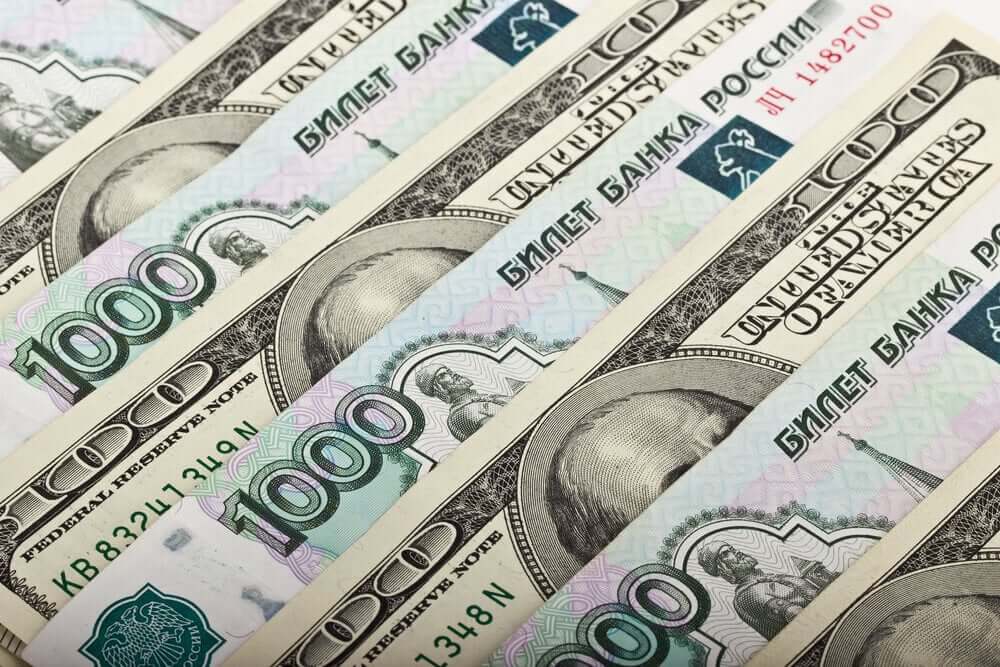
USDRUB Analysis: A Looming Crisis for the Russian Ruble
The USDRUB currency pair, representing the US Dollar against the Russian Ruble, is on the brink of further volatility, given the recent economic and geopolitical developments. The ruble’s sharp depreciation is a grim reflection of Russia’s dwindling economic prospects, raising alarms on a global scale. The dynamics underlying this decline, combined with external market forces, predict an even darker short-term future for the Russian currency.
The Historical Context:
For some context, the exchange rate witnessed a historical peak mid-August, with 1 USD fetching over 100 RUB. The Russian Central Bank‘s intervention brought some relief, pulling the ruble back to 95 per USD later the same month. The key interest rate was shifted up to 12% in mid August and up to 13% in September. In contrast, before Russia started its war on Ukraine, the interest rate was 8.5% in December 2021.
However, this reprieve was temporary, as the ruble once again veered close to the 100 mark, standing at 99.371 currently.
Catalysts for the Ruble’s Depreciation:
- War in Ukraine: Biggest threat to Russia’s economy are the sanctions imposed by western countries since the start of the war.
- Dollar Strength and Trade Flow Imbalance: The dollar has shown robust strength in the global market, causing additional pressure on the ruble. This imbalance in trade flows, with goods and services flooding the Russian market, increased the demand for hard currency, piling on the selling pressure.
- Shift to Safer Assets: The slow reopening of financial markets post-pandemic witnessed a rush by Russian firms and households to safer foreign assets, especially from nations that Russia deemed “friendly.” This heightened demand for foreign assets resulted in an outflow of capital, weighing on the ruble.
- Impact of Sanctions: Following Russia’s political maneuverings, the West slapped sweeping sanctions on the nation. The most damning was the oil embargo from the EU and the G7. Moscow, which heavily relied on these countries for its oil exports, found itself cornered, especially with the backdrop of China’s faltering economy and oil refining capacity challenges. Consequently, Russia’s trade surplus crashed by a massive 77% in July compared to the prior year.
- Oil prices: Prices of energies, such as oil and natural gas, started to increase as the autumn neared. However, warm weather pushes prices for Russian oil down. Russian national currency follows the path.
The Futile Efforts Russia’s Central Bank:
Despite these challenges, the Bank of Russia took aggressive measures, hiking its key rate by a staggering 3.5% since 2021. However, given the magnitude of external and internal pressures, these rate hikes appeared more like a desperate attempt to stem the decline rather than a decisive solution.
Russian Ruble Falling – Forward Projection: 1:107?
Given the prevailing conditions, it wouldn’t be audacious to project the USDRUB currency pair at 1:107 in the coming months. The patterns observed, marked by prolonged consolidation followed by a drastic move, are reminiscent of past trends. The ruble’s year-to-date decline stands at 67.86%, with a 6-month and 1-month decline at 23.91% and 3.66%, respectively.
Furthermore, the perceived inertia from the Russian government, combined with apprehensions surrounding its aggressive policies, is unsettling investors and traders. This undermines the central bank’s stabilizing measures, rendering them largely ineffective.
USDRUB Analysis – Conclusion:
For the Russian economy and its currency, the immediate future seems bleak. External sanctions, internal economic imbalances, and geopolitical apprehensions are forming a tempestuous mix. The Russian government and its central bank face an uphill task to stabilize the ruble and instill confidence among global investors. Only time will tell if they can navigate these choppy waters or if the ruble is destined for a further plunge.


